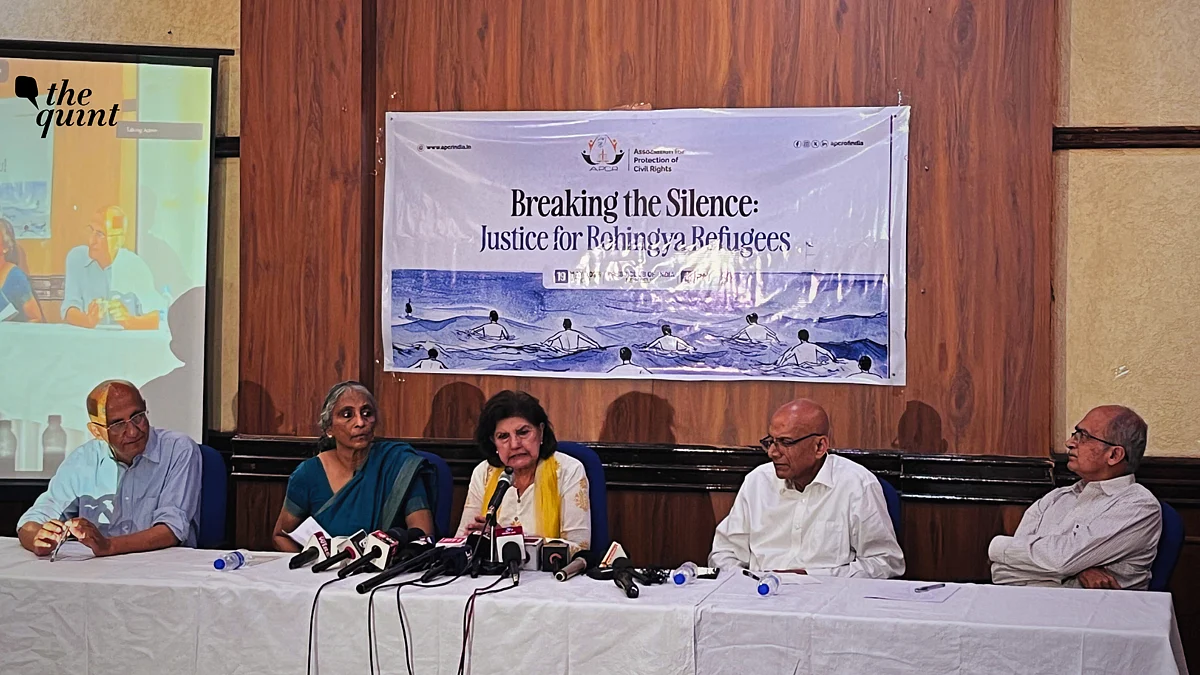
We Say 'Vasudhaiva Kutumbakam' But Throw Rohingyas in Sea: Lawyers, Journalists
"Our hearts have become so small, our tolerance so low that we can't even let 22,000 Rohingyas stay in India?"

advertisement
Days after it was reported that around 40 Rohingya refugees in India were "left" in international waters, journalists and lawyers held a key panel discussion in the Press Club of India on Monday, 19 May.
Headlined 'Breaking the Silence: Justice for Rohingya Refugees,' the panelists included, Human rights activist Harsh Mander, Senior Advocates Colin Gonsalves and Prashant Bhushan, senior journalist Pamela Philipose, The Azadi Project's Priyali Sur and writer Rita Manchanda.
The Quint reported an in-depth story of the families whose loved ones were abruptly taken away and its impact on them. In our story, we included details of the calls made with the deportees and the modus operandi of the deportation.
For context, around 40 Rohingya refugees were arrested from different parts of Delhi, flown from Hindon airport to Port Blair, Andaman and Nicobar islands, shifted on boats and then with life-jackets, allegedly dumped in the international waters in Southern Myanmar's Tanintharyi region by Indian authorities.
"Probably the most persecuted minority in the whole world and we have pushed them back like this," lawyers and journalists observed.
Sur cited case studies which recounted years of unjust treatment of Rohingyas by Indian authorities.
'We Have to Break Our Silence'
Taking note of this deportation, a UN expert has also begun an inquiry into the deportation, calling it "nothing but outrageous."
Mander pointed out a ruling by the International Court of Justice (ICJ) calling against the genocide by Myanmar's regime against Rohingyas. Myanmar has repeatedly stated that they do not consider Rohingyas as their citizens. They are stateless refugees and have fled to Bangladesh and India.
Meanwhile, Manchanda is also a petitioner in a case against detention of Rohingyas.
She pointed out that when US sent back Indian nationals, our country accepted them because we consider them as our citizens. But Rohingyas are being "forced to swim" to a place that does not recognise them as their own.
The panel at the Press Club of India.
(Photo: Aliza Noor/The Quint)
Why Lawyers Disagree With 'India Is Not a Dharamshala' Remark
Senior Advocates Prashant Bhushan and Colin Gonsalves referred to a recent observation by the Supreme Court rejecting a Sri Lankan Tamil refugee's plea. "India is not a Dharamshala, we cannot host refugees from all over."
This same line of argument is often used in the context of Rohingya refugees.
Advocate Gonsalves, who is appearing for the latest petition against the deportation, was told in the Supreme Court that his petition was a "crafted story," born out of "fanciful ideas."
But he stated that the UN expert's probe and the accounts and evidence they have gathered, corroborates their petition. On the 'Dharamshala' remark, he said:
Both the Advocates stated that despite the fact that even if India is not party to the Refugee Convention, through this deportation, India has violated several other laws and conventions.
Adding that this "undignified" deportation violates several international law principles: Genocide Convention, Convention against Torture, Convention on the Rights of the Child.
Notably, in the public discourse, a great deal of hate against Rohingyas is being spread. Even the daughter of India's foreign secretary faced hateful trolling online because she had in the past worked with Rohingya refugees as a lawyer.
The panelists stated that this is due to the anti-Rohingya, anti-refugee rhetoric by the government that has grown over the years since 2017-18, amplified during the election years.
Gonsalves and Bhushan also noted that a mindset has been inculcated that Rohingyas are terrorists, criminal-minded. But contrary to popular belief, there is not a single UAPA or sedition case against Rohingyas in any police station or court in India, they said, except a few minor theft cases.
Meanwhile, Philipose, critcising the deportation move asked, "What kind of impression would international community have when the world oldest democracy does this?"
- Access to all paywalled content on site
- Ad-free experience across The Quint
- Early previews of our Special Projects
Published: undefined